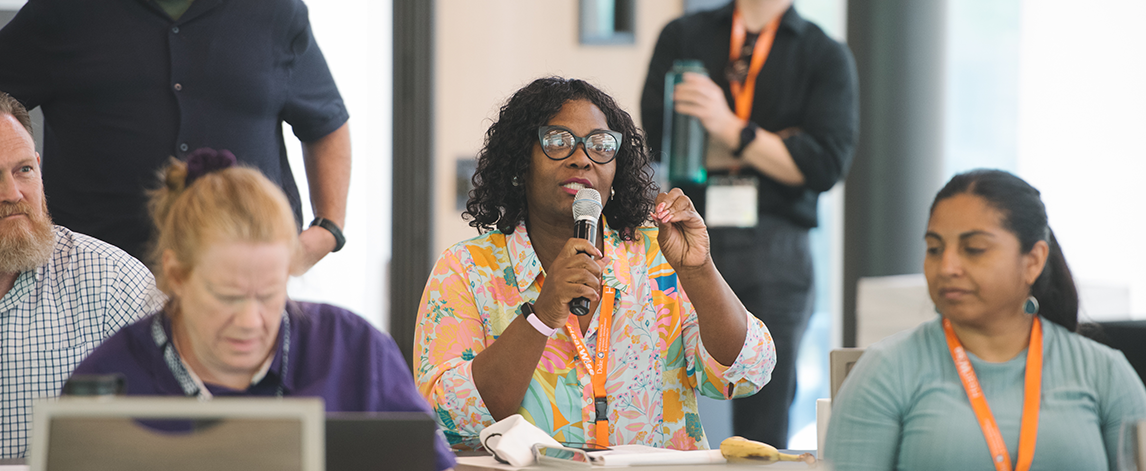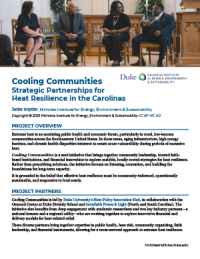Supporting Community-Driven Solutions for Heat Resilience
Project Partners
We partner with faith-based organizations and local leaders to understand community experiences with extreme heat.
Extreme heat is placing growing pressure on communities across the Carolinas, increasing energy costs, straining household budgets, and exacerbating health risks—particularly for communities with fewer resources. The Heat Policy Innovation Hub's Cooling Communities project, funded by an internal Duke University grant, takes a two-pronged approach to addressing this challenge:
- Community-Led Solutions – Partnering with faith-based organizations and local leaders to understand community experiences with extreme heat and co-develop strategies for resilience.
- Innovative Financial Tools – Exploring the feasibility of a parametric insurance model to provide financial relief for energy costs during extreme heat events.
Project Overview
Community Engagement & Faith-Based Partnerships
Engaging Church Partners Across the Carolinas: Hub experts are working with Interfaith Power & Light (NC& SC) and Duke Divinity School to identify and engage faith-based communities in the Carolinas. Churches are trusted hubs in their communities, providing spaces for outreach, resilience-building, and advocacy—so are uniquely positioned to advance heat resilience.
Understanding Community Needs: Through listening sessions and direct engagement, hub experts aim to better understand how communities experience and cope with extreme heat, with a particular focus on energy burden—the disproportionate impact of high energy costs on low-income households.
Providing Actionable Pathways: Students from Duke Divinity School will support the participating communities by developing concept notes—project proposals that congregations and community organizations can use to seek future funding for heat resilience initiatives, such as cooling infrastructure, energy efficiency programs, or community cooling centers.
Innovative Insurance Solutions for Heat Resilience
Partnering with Utilities & Insurers: The project brings together experts from the utility and insurance sectors to evaluate the feasibility of a parametric insurance product designed to alleviate energy cost spikes for low-income households during extreme heat.
How It Works: Parametric insurance pays out automatically when pre-defined extreme heat thresholds are met—helping households with fewer resources manage increased utility costs without bureaucratic delays.
Advancing Scalable Solutions: Findings from this analysis will be shared via a white paper outlining the feasibility, potential impact, and implementation pathways for such a product, with insights for policymakers, utilities, and insurers.
Why This Matters
Empowering Communities: By working directly with faith-based leaders, this project centers local voices in developing heat resilience strategies.
Addressing Energy Burdens: Extreme heat disproportionately affects low-income households, making energy costs an unsustainable burden. New financial models are needed to provide relief.
Bridging Community & Industry Solutions: Collaboration between communities, utilities, and insurers can unlock innovative approaches that benefit both households and businesses.
Cooling Communities: Strategic Partnerships for Heat Resilience in the Carolinas
Extreme heat is an escalating public health and economic threat, particularly in rural, low-income communities across the Southeastern United States. In these areas, aging infrastructure, high energy burdens, and chronic health disparities intersect to create acute vulnerability during periods of excessive heat. Cooling Communities is a seed initiative that brings together community leadership, trusted faith-based institutions, and financial innovation to explore scalable, locally rooted strategies for heat resilience. Rather than prescribing solutions, the initiative focuses on listening, cocreation, and building the foundations for long-term capacity. It is grounded in the belief that effective heat resilience must be community-informed, operationally sustainable, and responsive to local needs.




